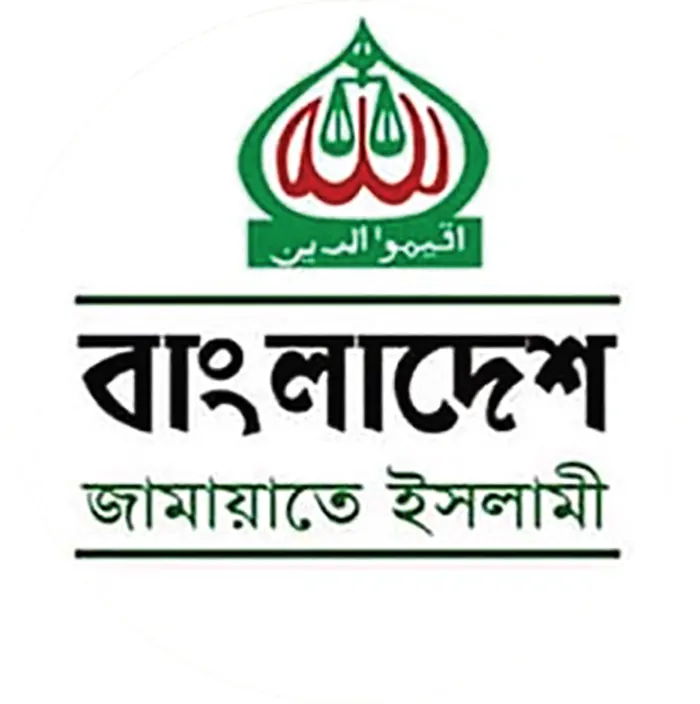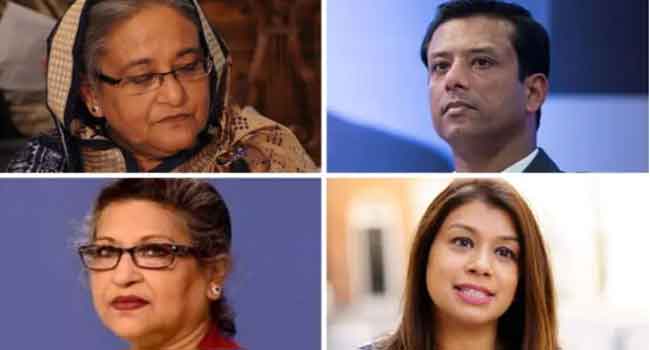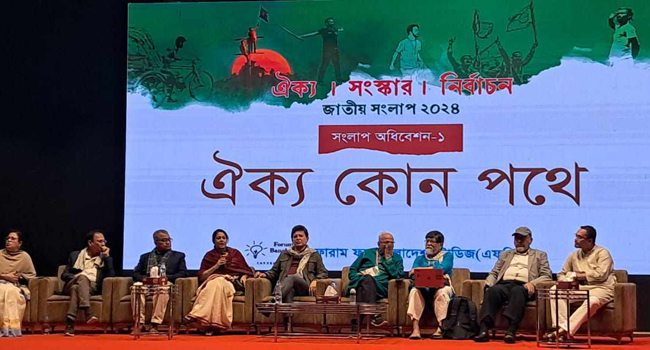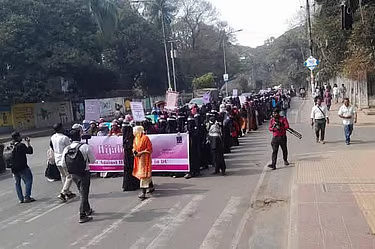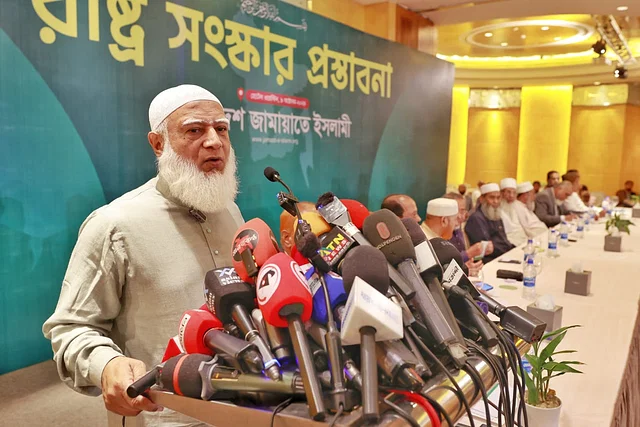
Jamaat-e-Islami has presented a 10-point reform proposal for an interim government, emphasizing changes in areas such as law, justice, parliament, and the electoral system. Syed Abdullah Mohammad Taher, Naib-e-Amir of the party, presented the proposal at a press conference today, held at Hotel Westin in Gulshan. Jamaat’s Amir, Shafiqur Rahman, and other senior leaders were also present at the event.
Later, Shafiqur Rahman explained that their comprehensive reform proposal actually consists of 41 points, but they have condensed it into 10 key points that are particularly relevant for an interim government. The rest will be addressed by the elected government.
In his speech, Shafiqur Rahman mentioned that an interim government should not handle all reforms, as the elected government needs to be tested on their commitment to change. He noted, “When we are in the opposition, our stance is one way, but as soon as we take power, we change completely. We want to test ourselves to see if our mindset remains the same after such a significant shift in position.”
Responding to a question from journalists, Shafiqur Rahman claimed that the Bangladeshi constitution was drafted in India in 1972 and, therefore, does not fully represent the country’s roots.
He further added that following a massive student and public uprising that claimed over 1,500 lives, the autocratic ruler Sheikh Hasina resigned on August 5 and fled the country. An interim government was formed on August 8, tasked with completing necessary reforms in the shortest possible time and conducting the 13th National Parliament election to hand over power to elected representatives. He stressed the need for substantial reform in several election-related institutions to ensure free, fair, and meaningful elections.
On behalf of Bangladesh Jamaat-e-Islami, Syed Abdullah Mohammad Taher, the Deputy Amir, presented a ten-point proposal for the reform of important and key sectors of the state.
Jamaat’s Proposal on Law and Justice
- There must be a well-defined and fair policy for appointing judges in the higher courts, and dual governance should be eliminated from the judiciary. Effective measures should be taken to separate the judiciary from the executive branch.
- A separate secretariat under the Supreme Court should be established, distinct from the Ministry of Law. Necessary amendments to existing laws should be made to ensure justice and to create laws that align with public values.
- The Cyber Security Act-2023 and all draconian laws should be repealed. To reduce prolonged legal proceedings, benches of the High Court should be established at the divisional level.
- A separate judicial commission should be formed to ensure the proper independence of lower courts, and an independent investigation committee should be established to investigate all criminal cases.
- Provisions should be made to resolve civil cases within a maximum of five years and criminal cases within a maximum of three years.
Parliamentary Reforms
- A Deputy Speaker should be appointed from the main opposition party, and institutional arrangements should be made for forming a shadow cabinet led by the parliamentary opposition leader.
- Sufficient time should be allocated for opposition members in Parliament.
Election System Reforms
- A proportional representation system (PR) should be introduced for the National Parliament elections. The caretaker government system should be permanently embedded in the constitution to ensure fair and transparent elections.
- The rejected EVM voting system from various countries should be abolished to ensure election transparency.
- No government employee should be allowed to contest in any election within three years of leaving their job.
- Local government elections should be conducted non-partisanly, and the political party registration system introduced in 2008, which contradicts the constitution, should be abolished to ensure participatory elections.
- A search committee, consisting of the Prime Minister, opposition leader, and Chief Justice, should be formed for appointing election commissioners and other commissioners.
- National Parliament elections should be held over multiple days. The management of National Identity Cards (NID) should come under the Election Commission.
Law and Order Reforms
- Police Reform: The Police Act enacted by the British government in 1861 should be amended, and a policy guideline for the police should be established.
- An independent police commission should be formed for the recruitment, transfer, promotion, and dismissal of police members, ensuring that no political or apolitical recommendations are accepted.
- Religious education and moral teachings should be included in the police training manual, and the use of lethal weapons by the police should be abolished.
- During interrogation while on remand, the presence of the defendant’s lawyer should be ensured, and for female defendants, their guardian’s presence should be confirmed.
- There should be provisions for forming police tribunals by judicial members, and the police’s duty and other facilities should be improved.
- The ‘Police Act’ should be modernized through amendments, enhancements, and modifications.
RAB Reforms
- Necessary reforms should be completed to regain public trust in RAB (Rapid Action Battalion) and other specialized forces. Those who have worked in RAB for the past 15 and a half years should be returned to their respective forces, and they should not be reappointed to RAB.
- All forms of extrajudicial killings should be stopped, and a cell should be formed to monitor RAB’s overall activities. If any RAB member is involved in unlawful activities, this cell will file charges against them.
- Guidelines for the media should be formulated and enforced.
Public Administration Reforms
- In recruitment, transfer, and postings, priority should be given to qualifications, skills, and integrity over lobbying, recommendations, and party loyalty.
- Recruitment processes should be completed in a reasonable time frame without delay, starting from job advertisements to hiring.
- Applications for government jobs should be free of charge, with an age limit for applications set at 35 years for the next two years and permanently at 33 years thereafter, with a retirement age of 62 years.
- Age discrimination in job applications should be eliminated, and special measures should be created in all government departments to prevent corruption, ensuring that no one gets an opportunity to engage in corrupt practices.
- Monitoring mechanisms should be established for this purpose, and existing inter-cadre discrimination in jobs should be eliminated. Those who gained employment through question paper leaks, corruption, fraud, or partisan considerations during the previous Awami government should have their appointments canceled.
Corruption
The Anti-Corruption Commission must appoint tested, honest, just, skilled, and competent individuals. Accountability must be ensured in all sectors of the state, and the Anti-Corruption Commission must be empowered to work independently and impartially. Appropriate provisions should be formulated to bring back the money siphoned off from the country during the previous government’s tenure and steps must be taken to implement those provisions. A ministry-based Anti-Corruption Commission should be established, and the laws governing the commission should be reformed along with an increase in personnel and scope. Clear laws must be enacted to take action against those illegally occupying state and public property.
Constitutional Reforms
Provisions should be added to maintain a balance of power between the President and the Prime Minister. No individual should serve as Prime Minister for more than two consecutive terms.
Reforms in Education and Culture
- Secondary education from grades six to ten and higher secondary education for grades eleven and twelve must be upheld. The public examination for the eighth grade should be abolished and the previous examination system restored. The textbooks should present a factual history of the popular uprising of 2024 with significance. Any content in textbooks that contradicts religious values must be removed. Essays containing biographies of great personalities, including the life of Prophet Muhammad (PBUH), should be added to all grades.
- Independent Ibtedaee madrasas must be established, and existing independent Ibtedaee madrasas should be nationalized. At least one Kamal madrasa in each district should be nationalized. Technical and vocational education should be integrated into mainstream education. A permanent education commission named ‘Department of Higher Education’ should be formed, ensuring representation from general, Alia, and Qawmi education in all sections of the education commission established for reform.
(b) Cultural Reforms
- Various types of films should be produced in light of the nation’s historical movements and values. Special days should be declared as national commemorative days to celebrate significant historical dates with state sponsorship.
- Entertainment programs, including dramas and films, must be free from obscenity. Provisions must be established to refrain from ridiculing various religions, especially Islam, in dramas, films, and other content. Instead of creating sculptures based on animal forms, the country’s nature and heritage should be depicted in various paintings and sculptures. Educational programs must be promoted across all media.
Foreign Affairs Reforms
- In foreign relations, mutual relationships should be maintained with all democratic countries based on equality and fairness. Initiatives should be taken under the United Nations for a water distribution agreement regarding international rivers among China, Nepal, India, and Bangladesh. Trade relations with ASEAN countries should be strengthened, and all agreements made with other states during the previous government should be reviewed, with a review commission formed for this purpose.
- Steps should be taken to initiate Bangladesh’s membership in the ASEAN bloc. Initiatives for a robust SAARC reorganization should be undertaken. If any agreement or memorandum of understanding is made with any country, it should be presented and discussed for approval in the next parliamentary session.
Reforms in the Ministry of Religion
- The Islamic Foundation of Bangladesh (IFAB) should be developed into a meaningful institution for the welfare of the state. The Imam Training Academy should be transformed into an independent entity or department so it can operate autonomously. An Islamic Mission should be established as an independent entity directly under the ministry. An independent department should be created for Hajj management, and effective measures should be taken to reduce the costs of Hajj and Umrah.
- A research institution should be established within the Islamic Foundation involving the country’s distinguished scholars. All controversial books must be banned, and their publications halted. The right of all religious communities to conduct their religious activities must be ensured.
Present at the press conference were the party’s Deputy Amir Mujibur Rahman, ANM Shamsul Islam, ATM Mashum, central leaders Saiful Alam Khan, Rafiqul Islam Khan, Matiur Rahman Akand, Hamidur Rahman Azad, Abdul Halim, Ehsan Mahbub Jobayer, Nurul Islam Bulbul, Selimuddin, and Mobarak Hossain.

